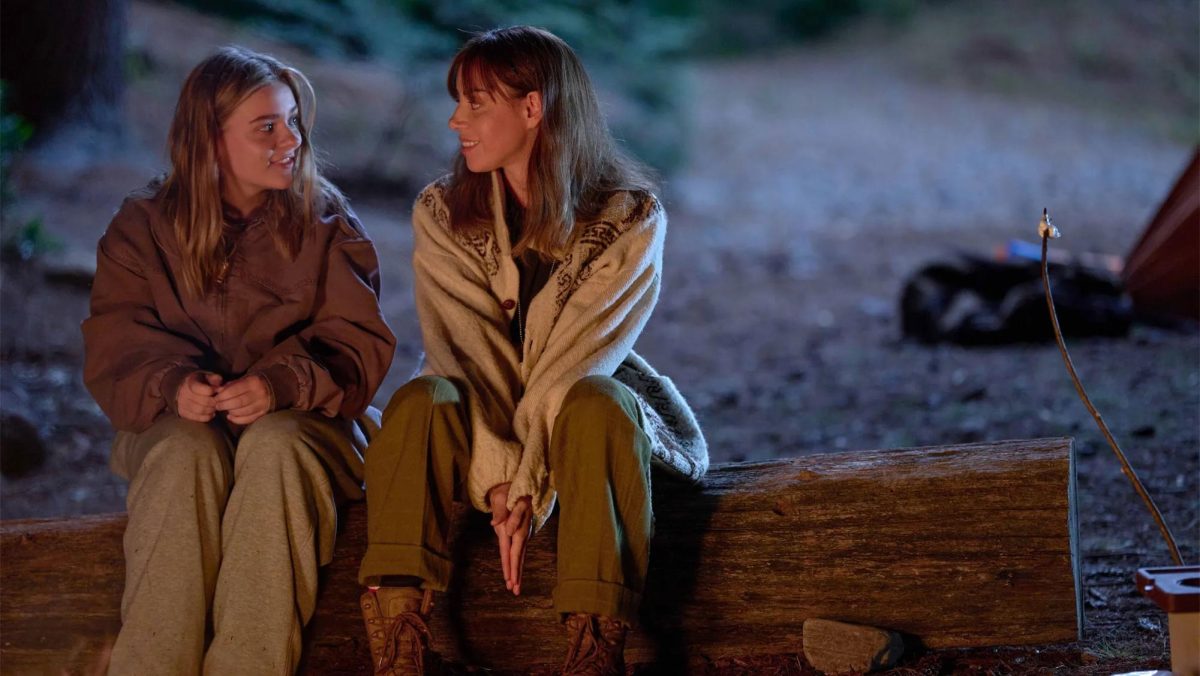We’ve all fantasized about coming face-to-face with our older selves at one point or another — wondering what they’d look like, what they’d be doing or who they’d spend their time with. Following the success of her debut, “The Fallout,” director Megan Park’s “My Old Ass,” taps into this innate, existential desire through a fresh spin on the coming-of-age dramedy that is nostalgic, moving and full of surprises.
We meet the nonchalant and wisecracking 18-year-old Elliott (Maisy Stella) during the last few weeks of her summer at home in Muskoka, Ontario — itching to get away so that her life can finally start at college in Toronto. When Elliott and her friends go camping in the woods and slurp on a brew of mushroom tea, the psychedelic trip brings Elliott face-to-face with her 39-year-old self (Aubrey Plaza). The older Elliott hangs around to present disappointing realities, nostalgic advice and vague warnings to her younger self — the most vague of all being to “avoid a guy named Chad” (Percy Hynes White). All of these musings from Elliott’s older self carve out what becomes her final and transformative summer at home.
The sisterly banter and sardonic quips between Elliott’s older and younger selves make the film shine. Tonal shifts throughout the film complement the back-and-forth between the two — the melancholic and bittersweet moments of Elliott encountering her older self are balanced out by the absurdity of the situation. The absurdities are reinforced by Plaza’s classic deadpan delivery, whether she’s warning her younger self to eat all the salmon “while it’s still around” or dispensing irritatingly vague love advice. Plaza and Stella are at their best during the emotionally complex finale that demands and achieves a subtle yet profoundly moving climax.
Park’s greatest strength, in both “The Fallout” and “My Old Ass,” is her ability to capture Gen Z’s speech patterns, thinking and feeling in an intricately woven screenplay. From Elliott’s Saoirse Ronan-obsessed younger brother and her own Justin Bieber “One Less Lonely Girl” fantasies to her crisis when feeling attracted to a boy for the first time, “My Old Ass” is a truly relatable experience for young viewers. The film also explores Elliott’s attraction to Chad as a natural, charming part of youth, focusing on how the experience helps her find her sense of self rather than reducing it to a simplistic or heteronormative narrative. While many other coming-of-age media have the distinct feeling of being written by a 35-year-old trying to sound like an 18-year-old, Park’s knack for language and effortlessly natural dialogue makes “My Old Ass” both relatable and hilarious.
Stella also delivers a knockout performance role as Elliott. Her delivery and undeniable swagger, matched by her careful portrayal of Elliott’s complicated emotions, make her character both charismatic and human. A particularly strong emotional scene between Elliott and her mother (Maria Dizzia) captures Stella at her best — the conversation will feel all too familiar to many in the audience.
The premise of the scene is simple — Elliott and her mother share a moment of reminiscing during her last few days at home. Her mother fondly remembers Elliott’s baby days, while Elliott realizes how much she will miss her mom, and how much she still needs her. This scene is Park’s way of lovingly embracing the film’s characters and the many generations it portrays.
What makes “My Old Ass” different from recent coming-of-age releases is its inherently philosophical premise. “My Old Ass” begs two questions: what if you could protect yourself from unbearable sadness? What do you wish your past self knew? While the majority of the film focuses on what Elliott can learn from her older self, the question is flipped on its head to emphasize what our older selves can learn from the people we used to be. Young and dumb aren’t necessarily synonymous — there’s often a lot to learn from our younger selves that gets lost along the way.
Contact Lulu Chatterjee at [email protected].


























































































































































